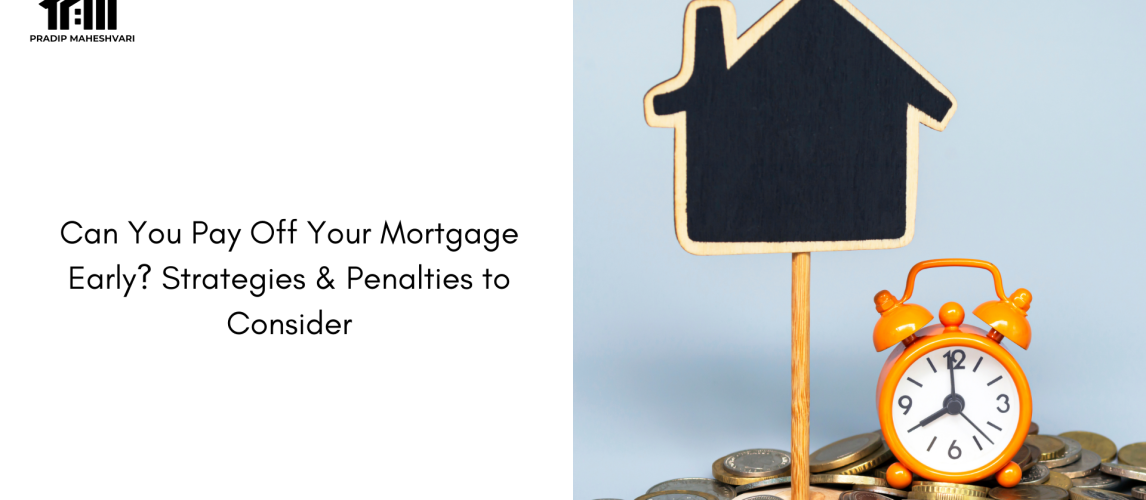Thinking of Paying Off Your Mortgage Early?
Owning your home outright sounds like a dream, doesn’t it? The thought of eliminating monthly mortgage payments and freeing up cash for other financial goals is exciting. But before you rush to pay off your mortgage early, you need to consider one crucial question: Will it actually save you money, or will penalties eat into your savings?
The answer depends on your mortgage terms, lender policies, and financial situation. In this guide, we’ll break down the benefits, potential penalties, and smart strategies to help you decide if early repayment is right for you.
Is Paying Off Your Mortgage Early a Good Idea?
In many cases, yes! Paying off your mortgage ahead of schedule can save you tens of thousands in interest and provide long-term financial security. However, some lenders charge prepayment penalties, which could offset your savings.
Pros of Paying Off Your Mortgage Early
- Save on Interest: The longer you carry a mortgage, the more interest you pay. Early repayment means less money spent on interest over time.
- Financial Freedom: No mortgage payments mean lower monthly expenses and more financial flexibility.
- Peace of Mind: Being debt-free eliminates financial stress and provides security, especially in uncertain economic conditions.
- Increased Home Equity: Paying off your mortgage sooner means building equity faster, which could be useful if you plan to sell or refinance.
Cons of Paying Off Your Mortgage Early
- Prepayment Penalties: Some lenders charge fees if you pay more than the allowed extra amount.
- Tied-Up Cash: Using extra money for mortgage payments means less liquidity for emergencies or investments.
- Lost Investment Opportunities: If your mortgage rate is low, investing excess funds elsewhere may yield higher returns.
How to Pay Off Your Mortgage Early: 5 Smart Strategies
If you’re determined to pay off your mortgage faster, here are proven methods that work, without triggering penalties.
1. Make Bi-Weekly Payments
Switching from monthly to bi-weekly payments can significantly reduce your mortgage term.
How It Works: Instead of 12 monthly payments, you make half-payments every two weeks (26 payments a year).
Why It Helps: You end up making one extra full mortgage payment annually, which can shave years off your loan.
Example: On a $400,000 mortgage with a 25-year term at 4%, bi-weekly payments can help you pay off your loan up to 3–4 years earlier.
2. Increase Your Regular Mortgage Payments
Most lenders allow you to increase your scheduled mortgage payments within a set limit.
Check Your Prepayment Privileges: Many banks let you increase payments by 10% to 20% per year without penalties.
How It Saves Money: Higher payments reduce your principal faster, leading to lower overall interest costs.
Example: If your regular payment is $1,500, increasing it by 10% ($150 more) could reduce your mortgage by years.
3. Make Lump-Sum Payments
A lump-sum payment goes directly toward your principal, reducing your total interest payments.
When to Do It: After receiving a work bonus, tax refund, or inheritance.
Lender Limits: Some lenders allow lump-sum payments of 10% to 25% of the principal per year without penalties.
Example: A $10,000 lump sum on a 20-year mortgage could save you over $7,000 in interest.
4. Shorten Your Amortization Period
When renewing your mortgage, consider choosing a shorter term.
Why It Works: A 15-year mortgage instead of a 25-year one means less interest paid overall.
Downside: Your monthly payments will be higher, so ensure your budget can handle it.
Example: A $300,000 mortgage at 4% over 25 years costs $175,000 in interest. Reducing it to 15 years lowers the total interest to about $99,000—a savings of $76,000!
5. Refinance to a Lower Interest Rate
Refinancing can help you save money and free up extra cash for prepayments.
When to Consider Refinancing: If interest rates drop significantly below your current rate.
How It Saves You Money: A lower rate means smaller payments, allowing you to put extra toward your principal.
Warning: Check for refinancing penalties before switching lenders.
Beware of Prepayment Penalties
Before making extra payments, check your mortgage contract for prepayment penalties. These fees vary based on your mortgage type:
- Fixed-Rate Mortgages: Typically charge the greater of three months’ interest or the Interest Rate Differential (IRD) (which can be expensive).
- Variable-Rate Mortgages: Usually have lower penalties, often just three months’ interest.
- Open Mortgages: No prepayment penalties, but they tend to have higher interest rates.
Tip: Call your lender and ask about your prepayment privileges before making any large payments.
Final Verdict: Should You Pay Off Your Mortgage Early?
Paying off your mortgage early can be a smart financial move, but it’s not always the best option for everyone. Consider your prepayment penalties, investment opportunities, and overall financial goals before making a decision.
If you’re unsure whether early mortgage repayment is right for you, Pradip Maheshvari Mortgages can help you analyze your options. Whether it’s refinancing, prepayment strategies, or penalty calculations, we guide you to the best financial decision for your situation. Ready to explore your mortgage options? Contact Today!


No comment yet, add your voice below!